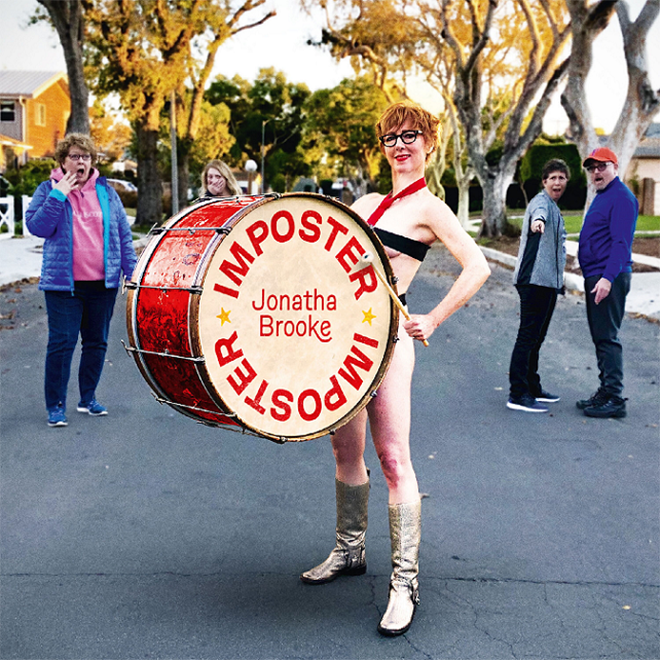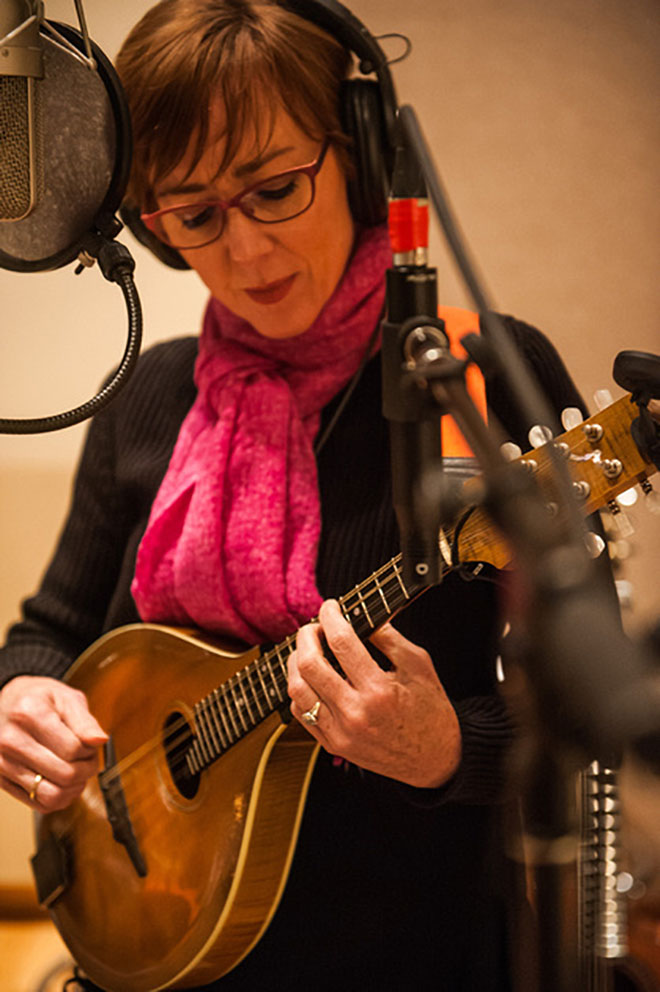VIDEO FEATURE & WEB-EXCLUSIVE INTERVIEW
Musician: JONATHA BROOKE
Song: “Imposter”
The acclaimed Jonatha Brooke will lead a Songwriting Retreat at Blue Rock Studioin Wimberley, Texas, June 14-16, 2019. There will be group sessions, performance opportunities and individual consultation. There are five sessions, plus song circle. All experience levels are welcome. The incredibly affordable price of $500 includes meals, and lodging is available at local B&Bs and cabin. It is limited to 21 participants. So if you’d like to be a part of this inspirational retreat weekend at the beautiful Blue Rock Studio in the Texas Hill Country, go to https://bluerockfoundation.org/events. As Jonatha says, “Don’t be afraid—it’s going to be wicked fun.”
Jonatha Brooke has been writing songs, making records and touring since the early 90s. She’s an incredibly talented singer, songwriter, guitarist and musician whose songs have tuneful melodies, rhythm, color and character. When you hear her sing, her voice soars above the unique and creative rhythms she creates. Her thought-provoking songwriting is incisive and her poetic words cut to the heart of the ideas created in each verse and chorus. Her guitar work, especially her chord choices and however she invents them, is truly otherworldly. The combination reveals a song that leaves the listener in awe while making you want to move your feet and your whole body with every powerful down beat.
For Brooke, songwriting has to flow naturally, and she says “I don’t believe in forcing a song into existence.” Brooke easily admits that she usually does everything she can to avoid sitting down and writing. She once said, “The irony is that even after 12 records, it doesn’t get easier.” Oddly enough, she enjoys working with deadlines—and a little pressure. She feels she can be more effective with time constraints. She says, “Songwriting has to flow naturally. I have to just let it happen. And when it does, I’m at the whim of the muse.”
After four major label releases, Brooke started her own independent label, Bad Dog Records in 1999, and has since released many more albums. She has co-written songs with Katy Perry for her 2013 album Prism, and with The Courtyard Hounds. She’s written for four Disney films, various television shows, and composed the theme song for Joss Whedon’s Dollhouse.Brooke developed a one-woman musical based on caring for her mother who suffered from dementia, and after her passing performed it Off-Broadway in New York City to raves. She is also working on other musical projects.
Today, we feature her video “Imposter” and a web-exclusive interview where Jonatha Brooke discusses songwriting and her creative process.
JONATHA BROOKE Web-Exclusive Interview
with M Music & Musicians magazine publisher, Merlin David
What is your approach to leading a songwriting workshop?

I approach the workshop by demystifying it, and making it less scary. People usually are afraid of exposing themselves while writing songs. I try to get them back to a childlike exuberance of creativity being really fun and very natural. As a kid, you wrote songs every day. You stomped around saying, “I—don’t—wanna—go—to—bed!” It had a meter, melody and rhythm to it. It’s the same kind of thing. It’s freeing yourself and finding different ways into that fun creativity. So whether it’s starting with a lyric, melody, some crazy chords or a rhythmic thing, I try to send people out with what I call some quick and dirty exercises. They have 20 minutes to not think too much, not edit themselves and not be precious, but to just go and try something. It’s usually extremely freeing to not be expected to have a perfect masterpiece in 20 minutes, but to just chip away at something from an angle that you might not have tried before.
Do people like that aspect—of giving them permission to be free?
They love it. I’ll send them out and say, “Just walk around and try different tempos of your footsteps. Start dancing—something that’s super rhythmic and super natural. It could be dumb, but that’s how I wrote “Linger” [the infectious song from 2001’s Steady Pullthat was a radio-ready hit]. Go for it. Try something new.
How didyou write “Linger”?
Walking through Ohio, I started cataloging things I was seeing. I was walking past the sprinklers and the newly painted porches, then the lemonade stand girls on a suburban afternoon. Then of course I thought, “OK, what am I doing?” Oh, it’s the end of my marriage. “I’m leaving ’cause I love you, I’m leaving ’cause I don’t. I’m hoping that you’ll follow, and I’m praying that you won’t. Let me go.” I was just walking around. I was on tour, and I was trying to get myself together for the next city before I left. I took a walk in this little neighborhood I ended up in—and that song came out. So, you just never know.
Did you write it down right away, or did you sit down later and write it?
First of all, I kept walking and repeating it to myself so I wouldn’t forget it—over and over and over again—for something like 3 miles. I just kept repeating the same thing. (Laughs) This is before cell phones and voice memos. I repeated it so that at least when I got back to the hotel, I could write it down. The melody came later when I actually forced myself to go to a little cabin on the mountain to finish all the little bits and pieces for that record, Steady Pull.
Aren’t you sometimes tempted to work on the melody right then?
That time I wasn’t tempted. I just kept it to that rhythmic structure. What is this rhythmic structure? What is it that feels great? This is an awesome tempo. It feels like a rocking song. I’m not going to prescribe anything yet. And then the chorus came much later. I got the verses first on that song.
What do workshop participants learn about themselves when they write a song?
Most of them learn that they are so not alone with all of their fears and all of their quirks. I am just as scared as they are—going into something. Everybody has that sort of “I suck” factor. (Laughs) We all learn that again and again. For me at least, that doesn’t change. I’m as insecure as the next person. Most creative people are. But there is fun in the company of others. Strength in numbers. (Laughs). There’s a relief in knowing that everybody is feeling the same insecurities.
I am able to convince them that we are all in the same boat. This is a totally safe place, and you can try stuff. We are all supporting you—to whatever it is that is your particular unique voice. That’s the other thing I really try to impress on people. They’re the only one of them—in the entire world. No one else will tell a story like they will. More importantly, no one else can tell a story that they will—their particular story with their unique voice. Whether it’s a trained voice, speaking voice or just a whisper—that is what’s unique and perfect about them. That’s a beautiful thing they can discover. What they might consider a limitation—could be their unique, amazing, perfect thing.
How did you realize that for yourself?
My uniqueness is a product of my own limitation. I’m not a trained musician. I’m not a trained singer. I don’t know what I’m doing. I just make stuff up. Because of that, I sound only like me. (Laughs)
You didn’t go to school for music?
No. I was an English major. That’s why I’m obsessed with words. Over the years, I’ve had to learn how to create music so that I can give charts to my musicians. I’ve had to learn how to write and notate music—especially when I’m working on these musicals. And that’s really hard for me, but a great challenge. I still do everything by ear, and by feel.

What is one of your goals for workshop participants and the songwriting process?
I would like them to enjoy being in a kindred group—that collaborative communion. That rooting for each other feeling that develops in these workshops. It’s amazing to see it. Once you have a hootenanny the first night, everybody is bonded in this awesome way, and they’re rooting for each other. I want them to be excited by things that are pushing their boundaries of how they might have approached something before. I want people who have never written a song to come and feel safe to try something—to try and bang on a drum and create some sort of rhythmic pattern over that—if that’s what happens.
Have you had that happen in one of your workshops?
A couple of people have come to songwriting workshops in Nashville, and I’ve had them actually speak their lyrics. Sometimes you can create a harmonic or haunting bed, and there are some lyrics that just want to be spoken. Maybe they don’t need a melody. Maybe it’s a poem that is read over some beautiful, lush arrangement. So, anything could happen.
Are there any perils of writing songs?
No. There is the peril of editing yourself too soon and being worried about saying too much. I’ve struggled with that over the years because I write some pretty intense things, but in the end I always discover that I just have to put it out there—it’s my story. If I’m hurting somebody, I’m really sorry, but it really is my telling, and my job. (Laughs) Sometimes it’s excavating and just drilling down to the absolute truth, and/or the absolute lie—whichever way you’re going to go. Really getting into the distinct details that make your words unique. You’re not generalizing. You’re not saying, “I love you, but you broke my heart” in a way that’s been said before. You are finding a different metaphor, a different way of saying it.
What would be the absolute lie?
Taking something that affected you—maybe telling a story about a breakup or some event that has happened that has impacted you in some way. Some people say you have to tell the truth in your songs. I say, make it even better than the truth. Embellish. It’s your song. The truth may be boring—make it exciting. (Laughs) I think Mary Gauthier’s whole thing is three chords and the truth. I say, how about 10 chords and lots of lies. (Laughs)
What are some of the payoffs in the songwriting process?
They’ll be freed up, and a lot less intimidated by the process. They’ll be excited about trying again a different way—picking up an instrument they’ve never played before, and having to jar their brain into a new mode. It was kinda like when I was writing songs for my Woody Guthrie album [The Works, 2008]. It was so freeing to see how fearless he was. He wrote everything down. He didn’t edit himself. He didn’t doubt. He didn’t think he sucked. He just wrote it all down. And no one got hurt. (Laughs) No one’s going to get hurt if you try stuff and it’s not a masterpiece. Just try again. I hope they walk away with this childlike enthusiasm for just trying stuff.

In our previous conversation, you said that Rickie Lee Jones and Chopin inspired you. Tell us about other songwriters or songs that inspire you.
I’m obsessed with a song by Belgian singer-songwriter Jacques Brel. I still haven’t recovered from it. It’s called “La Chanson des Vieux Amants” (“The Song of Old Lovers”). It’s a devastating, beautiful and poignant story. It’s basically about this couple that’s been together forever—through all their trials, tribulations, infidelities, fights, separations and reunions, but they still love each other. It’s just a brilliant song. I keep coming back to that song. And then my latest, I know it’s probably a 10-year-old record, but I’m obsessed with another Belgian guy Stromae, who is half Belgian and half Tutsi. [Paul Van Haver’s father was Rwandan, and mother Belgian]. I just think he’s a badass. It’s kinda like dance music, but his storytelling, his lyrics are in French, and he’s just brilliant. I think I’m tending to go with the French. (Laughs)
What is it that draws you to these songwriters or these particular songs?
They’re telling me a story and I don’t know how it’s going to end. And there’s so much emotion. I just live for breaking people’s hearts. There’s so much emotion in their delivery—in the story itself. In the way they produce and build the production. The sounds in the record—the orchestration, the production—it’s all of a piece. They are just brilliant storytellers in all of those mediums.
Tell us about your new song “Imposter.”
The song is about all the things we were talking about. It’s about insecurity and imposter syndrome—all the things I struggle with every time I go to write again. Or just face-to-face with my ambition and my career, and where do I set the bar. How do I recalibrate each time to make sure I really know what it is that I want out of my career? There are times when it gets pretty dark, and I wonder, “How am I going to continue to do this?” How am I going to pay the bills? How am I going to adjust with change? The music world has changed so incredibly. It’s amazing that you can get any song on any gadget—anywhere. It’s daunting to make a living as a songwriter and a performer. When you go into the creative mode, you hit this place where you think, “OK, how am I going to do this? Is it going to be OK this time? Was I just a loser to think that I could pull the wool over their eyes one more time? (Laughs) You struggle with that. I think everybody does. And I wrote about it. I cast myself as the emperor with no clothes.
How did you come up with the idea of the slides you used for the video?
I figured—hey, why not do a Throwback Thursday for a whole song. I don’t really have any other way to create a video. I’m not brilliant with cameras. I don’t have money to make a big video. My ideal thing would have been me parading around naked with a bass drum through a huge 4thof July parade in a small town in America. But that wasn’t going to happen. (Laughs) So I figured I’d do some smaller version. I found a street in Los Angeles to make that picture in the end the cover of the new record.

So that’s your new record?
Yes. I have a new EP that came out at the end of April. It’s called Imposter. It’s distributed through RED Distribution. That picture of me with the drum, I think it’s at the end of the video—that’s the cover. (Laughs) So it really is putting myself out there.
Was that difficult to do?
No. It was awesome. It was super fun. I pulled a bunch of favors. I borrowed that big drum from a guy in Los Angeles. I found a photographer who would do it for cheap. Pat’s daughter Lily is in the background there. My friend Bambi is there. The photographer’s next-door neighbor and her best friend are there. We called in all sorts of favors. We had just 20 minutes of decent light on her street and we took a bunch of pictures and called it a day. The FedEx guy kept driving by. (Laughs) The kids were coming home from school. I thought, “Oh, maybe we should wrap this up. I amnaked. It was not photoshopped.
Really? It wasn’t done with photoshop?
No, no, no, no. That’s full-on reality. No, that’s for real.

So, was that difficult to do?
No. Actually it wasn’t hard to do. It was such a crazy weird cool idea. As long as my husband’s OK with it. He said, “It’s a great idea. Go for it.” It’s kinda funny now. I realized I didn’t think it through. Because now I’m standing around after gigs signing CDs. It’s funny because I’m handing someone a naked photo. You can’t see anything, but I’m handing someone a naked picture of myself, and that’s just a really funny moment. Some people are uncomfortable, and some people are like, “This is awesome!”
What songwriting tip would you like to offer?
I say this in my songwriting workshops all the time. You must sing it, the way you would say it. Walk around—find a rhythm, a meter—some kind of cadence that isn’t just the same thing you’ve tried a million times. Hone it, pace it, talk to it. Speak it first. Hum it. Don’t fence it in. Get it in your body. Then, it will feel right when you locate its melody, its tempo, its key. For me, singing/writing is visceral, physical. When the song is a keeper, you feel it in your bones. Oh, and if there’s a really important word, do not deny the downbeat—say it on the one.
How many Songwriting Workshops do you do in any given year?
I do two workshops in Nashville every year, Denmark, Italy, and now Texas—at Blue Rock.
What’s the best advice you’d like to give songwriters?
Don’t be afraid—it’s going to be wicked fun.
How can new fans stay updated?
www.JonathaBrooke.com




comment closed